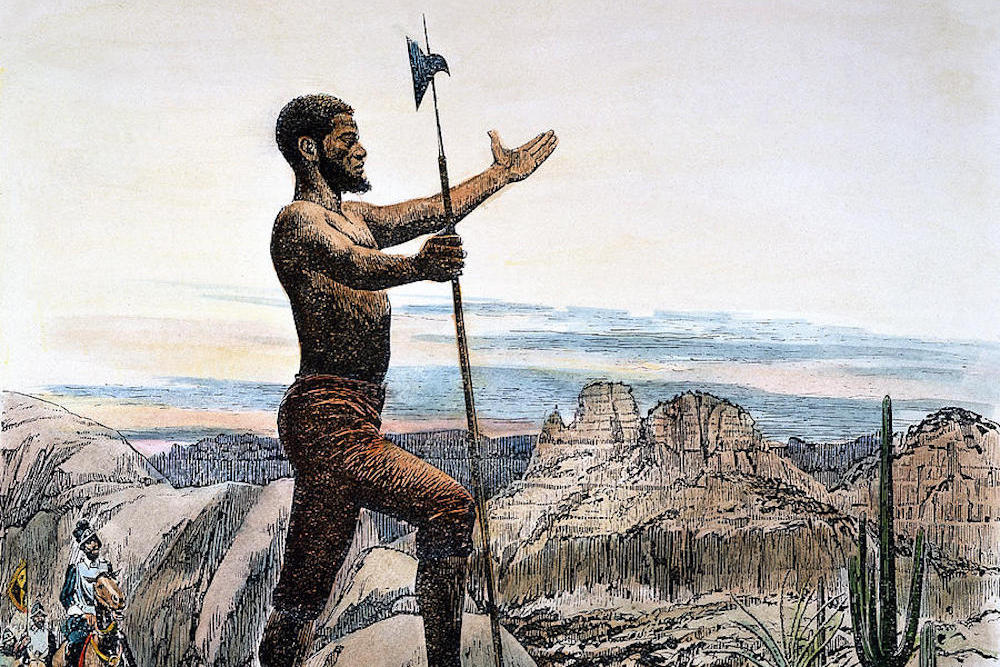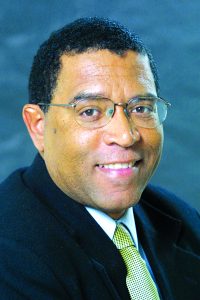Black History
Esteban: Enslaved African Became an Early Explorer of the New World
In 1534, Esteban and the four remaining survivors escaped. As the journey continued, he would become a scout, a diplomat and lead communicator. According to historians, Esteban was a gifted linguist, quickly mastering different Native American languages. He served as translator throughout what became a 15,000-mile journey.

The year 1619 is historical: An English privateer ship reached Point Comfort on the Virginia peninsula. Its arrival represented the dawn of the institution of slavery in America. Today, more than 400 years later, the events of that year remain surrounded by misconceptions and debate.
What historians have uncovered is that the first enslaved African to land on what would become North American soil was named Esteban (de Dorantes from his status as an enslaved person). According to historian Robert Goodwin, “Esteban was shipped to Spain as a slave from the town of Azemmour, in Morocco, in 1522. Andres Dorantes de Carranza purchased him and brought Esteban to [what would later become] Florida in April 1528.”
Long before the Lewis and Clark Expedition (1804–1806), Esteban, said to have been Muslim and born sometime around 1500 in Morocco, would traverse the land from the Southwest to the Pacific Ocean. His fate would extend beyond servitude and little of his life would be recorded.
Esteban left Spain for the New World in 1527 as part of an expedition to conquer and colonize Florida. The ship landed in the area that is now Tampa Bay, and the explorers wandered through the swamps and jungles for about a year. Several died as a result of hunger, disease, and skirmishes with Native Americans. With only a few boats left, they decided to return to Mexico City.
Hit hard by the Gulf currents, only 15 of the 80 men survived. Choppy waters dragged them to a place just west of the Mississippi: Galveston Island. They began to explore what would become Texas. Soon they were captured and enslaved for five years by the Karankawa Indians.
In 1534, Esteban and the four remaining survivors escaped. As the journey continued, he would become a scout, a diplomat and lead communicator. According to historians, Esteban was a gifted linguist, quickly mastering different Native American languages. He served as translator throughout what became a 15,000-mile journey.
Still, he was considered Dorantes’ slave.
The trek across Texas to Mexico City was challenging; the explorers were met by both friendly and hostile Native Americans. They were mostly barefoot and naked, and often starved for food. One of the stories told is that along the way they were considered “children of the sun” by some Native American tribes. Others revered them as shamans. But not everyone was fond of the strangers.
The Zuni Indians of Hawikuh in New Mexico grew to distrust Esteban quickly, labeling him a “harbinger of unwanted and dangerous visitors.” In May 1539, they executed him. By the time of his death, some historians say that Esteban and his three companions “had seen more of the North American southwest than any other non-Native American.”
Almost two centuries would pass before another Spanish expedition would discover other Africans living alongside Native Americans near the mouth of the Rio Grande. Historians say that these Africans were likely survivors of other expeditions or shipwrecks. Nevertheless, Esteban had been the first.
Activism
AI Is Reshaping Black Healthcare: Promise, Peril, and the Push for Improved Results in California
Black Californians experience some of the worst health outcomes in the state due to systemic inequities, limited healthcare access, and exclusion from medical research. 16.7% of Black adults report fair or poor health, versus 11.5% of Whites. Black adults have the highest death rates from prostate, breast, colorectal, and lung cancer. Statewide, diabetes affects 13.6% of Black adults versus 9.1% of Whites, and 27% of Black adults over 65 have heart disease, compared to 22% of Whites. Life expectancy for Black Californians is about five years shorter than the state average.

Joe W. Bowers Jr.
California Black Media
Artificial intelligence (AI) is changing how Californians receive medical care – diagnosing diseases, predicting patient needs, streamlining treatments, and even generating medical notes for doctors.
While AI holds promise, it also poses risks, particularly for Black patients. It can provide faster diagnoses and expand access to care, but it may also misdiagnose conditions, delay treatment, or overlook patient’s critical needs. AI’s impact on Black patients depends on how biases in medical data and algorithms are addressed in its development.
“As we progress toward a society with increased use of AI technology, it is critical that the biases and stereotypes that Black Americans have faced are not perpetuated in our future innovations,” said Dr. Akilah Weber Pierson (D – San Diego), a physician and state senator spearheading legislative efforts to address AI bias in healthcare.
Why AI Matters for Black Californians
Black Californians experience some of the worst health outcomes in the state due to systemic inequities, limited healthcare access, and exclusion from medical research. 16.7% of Black adults report fair or poor health, versus 11.5% of Whites. Black adults have the highest death rates from prostate, breast, colorectal, and lung cancer. Statewide, diabetes affects 13.6% of Black adults versus 9.1% of Whites, and 27% of Black adults over 65 have heart disease, compared to 22% of Whites. Life expectancy for Black Californians is about five years shorter than the state average.
Benefits and Risks of AI in Healthcare
AI processes vast amounts of medical data using computer algorithms designed to identify patient health patterns, helping doctors to diagnose diseases, recommend treatment, and increase patient care efficiency. By analyzing scans, lab results, and patient history, AI can detect diseases
earlier, giving it the potential to improve care for Black patients, who face higher risks of prostate cancer, diabetes, heart disease and hypertension.
Dr. Judy Gichoya, an Interventional radiologist at the Emory University Winship Cancer Institute and AI researcher at Emory’s Healthcare AI Innovation and Translational Informatics (HITI) Lab, sees AI as a tool with great potential but cautions that its effectiveness depends on the diversity of the data it is trained on. She says, “Without diverse datasets, AI could overlook critical signs of diseases, especially in underrepresented populations like Black patients.”
Dr. Timnit Gebru, a computer scientist and AI ethics expert, is the founder and Executive Director of DAIR (Distributed AI Research Institute) in Oakland. She has extensively studied bias in AI systems and their impact on marginalized groups.
Gebru acknowledges that AI has the potential to improve healthcare by enhancing efficiency and expanding access to medical resources. But, like Gichoya she strongly stresses that for AI to be effective and equitable it needs to be subject to rigorous oversight.
AI is already helping doctors personalize cancer treatment by identifying biomarkers and genetic mutations. UCSF and Stanford Health use AI to analyze tumor DNA to match patients with the most effective chemotherapy or immunotherapy.
In diabetes care, AI predicts blood sugar fluctuations, helping doctors adjust treatment. It helps radiologists in early disease detection and identifies sepsis sooner, reducing hospital deaths. In cardiology, AI detects early signs of heart disease, spotting plaque buildup or abnormal heart rhythms before symptoms appear. It also helps predict strokes by analyzing brain scans to determine risk and guide intervention.
Kaiser Permanente uses AI scribes to reduce paperwork and improve patient interactions. Covered California has partnered with Google
Cloud to use AI to streamline document verification and eligibility decisions.
Despite these advancements, AI systems trained on biased medical data can perpetuate inequities for Black patients.
Gebru explains, “If AI learns from historically discriminatory medical decisions—such as undertreating Black patients—it will scale those biases.”
A notable example is in dermatology, where AI frequently misdiagnoses conditions in Black patients because most training datasets are based on lighter-skinned individuals. “Melanoma looks very different on darker skin,” Gebru notes. “It’s not just darker—it often appears differently, like under toenails, a pattern AI trained mostly on lighter skin won’t detect.”
Another risk of AI in healthcare is automation bias, where healthcare providers over-rely on AI, even when it contradicts medical expertise. “Doctors who would have prescribed medications accurately without AI sometimes make mistakes while using automated tools because they over-trust these systems,” Gebru adds.
AI-driven health insurance claim denials are a growing concern. UnitedHealthcare faces a class-action lawsuit for allegedly using an unregulated AI algorithm to deny rehabilitation coverage to elderly and disabled patients.
Beyond bias, AI also poses an environmental threat. AI systems require enormous amounts of energy for computing and massive amounts of water to cool data centers, which exacerbates climate change, an issue that already disproportionately impacts Black communities.
Trump Administration and DEI Impact
The Trump administration’s efforts to dismantle Diversity, Equity, and Inclusion (DEI) threatens funding for AI bias research in healthcare.
Less federal support could stall progress in making AI systems fairer and more accurate, increasing discrimination risks for Black patients.
California’s Legislative and Regulatory Response
Recognizing AI’s risks in healthcare, California lawmakers and state officials are implementing regulations. Weber Pierson introduced Senate Bill (SB) 503 to ensure that AI algorithms used in healthcare are tested for racial bias before implementation.
“We’ve already seen how biased medical devices like pulse oximeters can fail Black patients,” Weber Pierson explains. “If algorithms used in patient care aren’t inclusive, they’re not going to accurately serve melanated individuals.”
At a press conference introducing SB 503, Weber Pierson stressed that AI must be held accountable. “This bill focuses on ensuring that software used as an accessory to healthcare staff delivers sound, nondiscriminatory decisions that promote equitable outcomes.”
Other legislative efforts include Senate Bill (SB) 1120, by Sen. Josh Becker (D-Menlo Park), which stops insurance companies from using AI alone to deny or delay care and Assembly Bill (AB) 3030, by Assemblymember Lisa Calderon (D-Whittier), which requires healthcare providers to inform patients when AI is used in their care.
Attorney General Rob Bonta has issued a legal advisory barring AI from unfairly denying healthcare claims, falsifying records, or restricting access to care based on medical history. Gov. Gavin Newsom’s 2023 executive order directs state agencies to assess AI’s impact and establish consumer protections, particularly in healthcare.
Actions Black Patients and Families Can Take
As AI becomes more common in healthcare, Black Californians can ensure fair treatment by asking if AI is used, seeking second opinions, and supporting groups addressing algorithmic bias.
They can:
- Ask their healthcare providers whether AI played a role in their diagnosis or treatment.
- Request second opinions if an AI-generated diagnosis seems questionable.
- Advocate for AI policies and legislation promoting fairness and accountability. · Engage with community health organizations like the California Black Health Network (CBHN) that is engaged in ensuring AI is developed in ways to improve health outcomes for Black patients.
Rhonda Smith, CBHN’s executive director, says bias in medical algorithms must be eliminated. “There should never be any race-based adjustment in delivering patient care,” she said.
CBHN supports inclusive research and legislation like SB 503 to ensure AI promotes equity.
Ensuring AI Benefits All Communities
As a legislator, Weber Pierson is pushing for stronger safeguards to ensure AI serves all patients equitably. She says, “Innovation and technology are good, but new challenges arise if we don’t move in a direction inclusive and thoughtful of all people who utilize the healthcare space.”
AI has the potential to revolutionize healthcare, but experts warn it must be developed and regulated with transparency, accountability, and fairness – ensuring it reduces rather than worsens, racial health disparities.
Activism
S.F. Businesswomen Honor Trailblazers at 44th Annual Sojourner Truth Awards and Scholarship Luncheon
This year’s well-deserved award recipients were women who graciously and continuously have served and empowered the Bayview community and beyond.

By Rev. Dr. Rochelle Frazier
Special to The Post
On Saturday, April 19, the San Francisco Business and Professional Women’s Club (SFBPWC) held its sold-out 44th Annual Sojourner Truth Awards and Scholarship Luncheon at the Southeast Community Center at 1550 Evans Ave. in San Francisco.
The luncheon’s theme was “Moving Forward with a Purpose: From Trailblazers to Game Changers.”
This year’s well-deserved award recipients were women who graciously and continuously have served and empowered the Bayview community and beyond.
Carol Evora Tatum received the National Sojourner Truth Meritorious Service Award for her decades of leadership and dedicated community service.
Brittany Doyle, founder and CEO of WISE Health SF, was honored as the Businesswoman of the Year because of her insightful and innovative business acumen regarding community-centered health programs.
La Shon A. Walker was recognized as the Professional Woman of the Year for her community empowerment and leadership work as the vice president of Community Affairs at FivePoint.
The luncheon also provides an opportunity to present scholarships to well-deserving students. The scholarship awardees were Jayana Harbor and Zari Moore, both graduating from Immaculate Conception Academy, and London Robinson, who is graduating from Raoul Wallenberg Traditional High School.
Harbor plans to attend Morgan State University in Baltimore, Maryland; Moore will attend Loyola University in New Orleans, and Robinson will attend Southern University and A&M College in Baton Rouge, Louisiana.
“The 44th Annual Sojourner Truth Awards and Scholarship Luncheon is more than a celebration,” said Cheryl Smith, president of SFBPWC. “It’s a tribute to the legacy of Black women who have paved the way and made a commitment to uplifting future generations. We are proud to honor extraordinary leaders in our community and invest in the bright minds who will carry us into the future.”
Activism
Teachers’ Union Thanks Supt. Johnson-Trammell for Service to Schools and Community
“I speak for our Oakland community and the families OEA serves in thanking Supt. Johnson-Trammell for her service. With public schools and immigrant families under attack nationally from Trump and with budget challenges affecting many California school districts, these are tough times demanding the best of what we all have to offer,” said OEA President Kampala Taiz-Rancifer in a statement released Thursday.

The union calls for a community-involvement in search for new superintendent
By Post Staff
While pointing out that Supt. Kayla Johnson-Trammell has been planning to resign for a while, the Oakland Education Association (OEA) thanked her for years of service to the schools and called for community involvement in the search for a new superintendent.
“I speak for our Oakland community and the families OEA serves in thanking Supt. Johnson-Trammell for her service. With public schools and immigrant families under attack nationally from Trump and with budget challenges affecting many California school districts, these are tough times demanding the best of what we all have to offer,” said OEA President Kampala Taiz-Rancifer in a statement released Thursday.
“While we disagreed strongly on a number of issues,” said Taiz-Rancifer, “Dr. Johnson-Trammell is a daughter of Oakland and a product of our public schools. We thank her for her service and wish her the best moving forward.”
She said the schools’ community was aware that the superintendent had been planning to leave well before this week’s announcement.
“The superintendent has spoken publicly throughout the year about her planned departure. In August 2024, the previous school board approved a renewed contract raising her compensation to over $600,000 per year and allowing her to step back from daily responsibilities beginning in the 2025-2026 school year,” said Taiz-Rancifer.
She said the teachers’ union has been raising concerns about the need for stability and financial transparency in the district. “For three of the last four years, the district projected major deficits, only to end with millions in reserve.” This year, she said, the district added $90 million to central office overhead expenses.
“Just last month, a majority of school board directors took action to cap expensive consultant costs and develop alternative budget proposals that align spending with community priorities to keep funding in classrooms,” she said.
Taiz-Rancifer said the union stands behind the leadership of Board President Jennifer Brouhard and Boardmembers Valarie Bachelor, Rachel Latta, and VanCedric Williams.
-

 Activism4 weeks ago
Activism4 weeks agoOakland Post Endorses Barbara Lee
-

 Activism3 weeks ago
Activism3 weeks agoOakland Post: Week of April 2 – 8, 2025
-

 #NNPA BlackPress3 weeks ago
#NNPA BlackPress3 weeks agoTrump Profits, Black America Pays the Price
-

 Activism2 weeks ago
Activism2 weeks agoOakland Post: Week of April 9 – 15, 2025
-

 #NNPA BlackPress3 weeks ago
#NNPA BlackPress3 weeks agoHarriet Tubman Scrubbed; DEI Dismantled
-

 #NNPA BlackPress3 weeks ago
#NNPA BlackPress3 weeks agoTrump Targets a Slavery Removal from the National Museum of African-American History and Culture
-

 #NNPA BlackPress3 weeks ago
#NNPA BlackPress3 weeks agoLawmakers Greenlight Reparations Study for Descendants of Enslaved Marylanders
-

 #NNPA BlackPress3 weeks ago
#NNPA BlackPress3 weeks agoNew York Stands Firm Against Trump Administration’s Order to Abandon Diversity in Schools























































